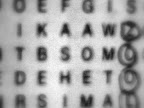I'm not convinced
"The Road to a South African Driver’s License," from Wednesday's front page, was a cute look at just what it takes to be able to drive legally in that nation. I don't doubt it's tough. But I think Michael Wines went a bit overboard in trying to state the case that the system is difficult and ineffective. Take this bit:
For the K53 is just part of the Catch-22 that faces every aspiring motorist here: To drive legally, one very sensibly needs a license. Except that licenses often seem impossible to get.
Well, that's unfortunate for them. But I don't see where a "Catch-22" is involved, or any logical twist, for that matter. You need a license to drive legally. Sort of like a lot of places. Next:
Even though the K53 method has been used for a dozen years — or perhaps because so few drivers have obtained licenses — traffic accidents and deaths are rising fast, to 15,400 fatalities last year, up nearly 9 percent from 2005.
If this was a policy instituted a dozen years ago, why are we looking at the fatality increase from 2005 to 2006? If there is a statistical case that a policy change that long ago would have a sudden impact more than a decade later, Wines doesn't present it. Nor does he give the statistics for the entire time period, from now back to before the change was instituted -- so it's impossible for the reader to fairly judge the matter of cause and effect. Wines continues:
The fatality rate per mile traveled, the best measure of road safety, is five times that in the United States, which is in turn higher than in most developed nations.
It does sound dangerous, and it's useful information to an American reader who might consider traveling in South Africa. But far more useful in making the case of the article would be to compare South Africa to nations more similar to it than the United States or other wealthy nations. South Africa ranks 56th in the world in GDP per capita; a better, if imperfect comparison would be to compare its road fatality rates with those in Croatia, Libya and Chile.
Of course, that's a bit harder to find, so..


0 Comments:
Post a Comment
<< Home